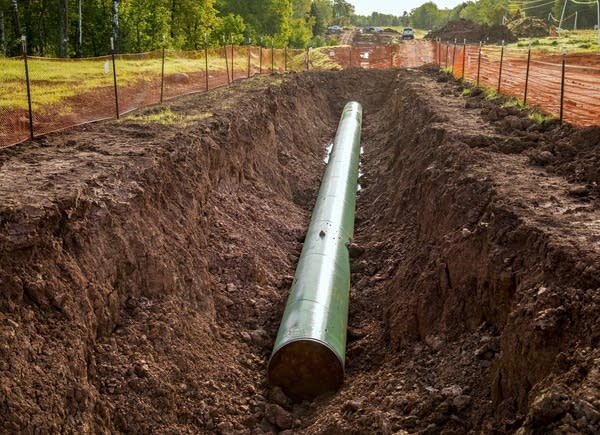Ruling on Line 3 leaves both sides seeing benefits

Go Deeper.
Create an account or log in to save stories.
Like this?
Thanks for liking this story! We have added it to a list of your favorite stories.
Supporters and opponents of a proposed oil pipeline in northern Minnesota both saw something to like in a long-awaited report released late Monday. In it, a state administrative law judge recommended that state regulators approve the so-called Line 3 project - but only if the new pipeline is built along the same route as the current line.
Canada-based Enbridge Energy is proposing to shut down its current Line 3, and build a new line, along a partially different route. That new line would be able to carry about twice as much oil as the current one.
In her 434-page report, administrative law judge Ann O'Reilly said it's reasonable for Enbridge to replace the old line. The old line is corroding and cracking. The judge said it "poses significant integrity concerns for the state."
She also said Minnesota refiners would benefit from the additional oil carried on a new line.
Turn Up Your Support
MPR News helps you turn down the noise and build shared understanding. Turn up your support for this public resource and keep trusted journalism accessible to all.
"This is an incredible victory," said Nancy Norr, chair of the labor and business group Jobs for Minnesotans. "We had a Department of Commerce recommendation that this line was not needed, and we want to reinforce the report finding that the certificate of need is valid, that this is a project that needs to be moved forward in the best interests of Minnesotans."
However, the judge also said that the benefits a new pipeline would bring are not worth the risks of building it along a new route. Enbridge's preferred path diverts from the current corridor west of Bemidji. It would travel south near the headwaters of the Mississippi River, to around Park Rapids, and then east to Wisconsin.
Instead, the judge recommends replacing Line 3 along its current route — which it shares with five other lines from Alberta. O'Reilly said that would isolate the environmental risks to an already active pipeline corridor, and not open up another one. She said it would also prevent the abandonment of nearly 300 miles of pipeline underground.
That logic appealed to Scott Strand, an attorney representing a group called Friends of the Headwaters, which opposes Enbridge's proposed route.
"To run a new tar sands pipeline through the headwaters region, through some of the most sensitive groundwater, drinking water in our state, through the wild rice beds, the new corridor would impose too many costs and risks to justify the very limited benefit of the line," he said.
But Kevin Pranis, a spokesperson for the Laborers International Union of North America in Minnesota and North Dakota, said there are two big challenges to replacing Line 3 along its current route.
"One of which is there are safety and integrity concerns because there are so many pipelines in that corridor," he said. "Replacing a pipeline, while technically possible, certainly poses more risks than we would want to see for a replacement."
More importantly, Prannis said, the current pipeline corridor runs through the reservations of the Fond du Lac Band of Lake Superior Chippewa, and the Leech Lake Band of Ojibwe. And in a statement last November, the Leech Lake band said it "will not allow any replacement of Line 3 whether in trench or alongside the current Line 3." And if the pipeline is brought to their reservation, then the band "will have no choice but to defend ourselves by any means necessary."
The report from the administrative law judge is not binding on the five-member Public Utilities Commission which will make the final decision whether to grant Enbridge a certificate of need and route permit to build the new pipeline.
In a statement, Enbridge spokesperson Jennifer Smith said she's pleased the judge has listened to the evidence that there's need for the project.
Sierra Club attorney Leili Fatehi said the report is more nuanced.
"From one standpoint I think it's safe to say that this decision, or her recommendation is a loss for Enbridge," Fatehi said. "Now, to what extent we want to claim it as a win for the environment, I feel less secure in making that claim."
The Sierra Club and other parties now have 20 days to file exceptions to the judge's report. The state is expected to make a final decision on Line 3 in June.
'>


